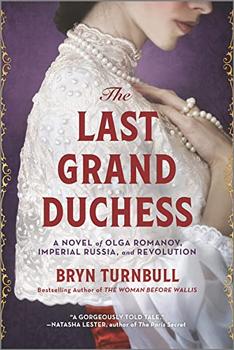Page 1 of 4
There are currently 23 member reviews
for The Last Grand Duchess
-
Maxine D. (Chicago, IL)
The heartbreaking, short life of a cloistered princess.
"The Last Grand Duchess" by Bryn Turnbull is a historical novel that concentrates on Olga, the eldest daughter of Nicholas and Alexandra. Unable to avoid their fate the author provides a realistic view into a close knit family that was often stifling and overprotective and very out of step with the moving of the times. The characters are well developed and the list of characters and the glossary were helpful. I enjoyed this book and strongly recommend it to other readers who enjoy well-researched and written historical novels.
-
Barbara Brown
The Last Grand Duchess
Excellent book, I always love stories about the Romanov Family and found this to be one of the best I have read. I liked how it went back and forth in the times of their lives.
Excellent book
-
Mary Lou F. (Naples, FL)
Russian History
Great historical novel. Anyone wanting to learn about the Romanov Dynasty, this is the book to read.
-
Lin Z. (Downers Grove, IL)
A Russian story
I was hooked on this story from the first page! It is an engrossing historical novel that tells the story of the eldest daughter of Tsar Nicholas in Russia. Olga's life is intertwined with the historical occurrences of the early 20th century in Russia. Olga is not able to attend balls and be in society. She lives an almost cloistered life with her family. She is very innocent and naïve. They do not live the typical lives of royals, but prefer to stay alone in the palace, and entertain to a minimum. This is in an effort to never disclose the medical condition of Olga's brother and heir to the throne, Alexei who is a hemophiliac. This effort costs them family and friends, and the peasants love to support them when revolution was on the horizon. Also to complicate events was Grigori Rasputin who was a priest who could somehow help Alexei when doctors could not. Soon rumors were all over the country about how the tsarina needed the priest to be with them. Right or wrong, people started to believe that he had too much influence on the crown.
I enjoyed this novel, as I always saw the Romanovs as victims. This story shows they were participants in the demise of the government in Russia by their own egos, naivete, and lack of empathy for their people.
-
Sandra O. (Alexandria, VA)
Best Historical Novel of the Romanov Family Ever!
This excellent and riveting and well researched story of the final years of the 300 year Russian monarchy which focuses on the oldest Daughter of Nicholas II is amazing. Bryn Turnbull has included a list of characters, a bibliography and in the author's note she tells how and why she wrote about Olga. The story begins in 1907 in Russian and ends in 1952 in Ontario, Canada. The personalities of each of the characters stands out and in the end it is love and loyalty. Olga's great grandmother was Queen Victoria and she was the one who carried the hemophilia gene. The cover is a perfect beginning to carry you away to the Russia of yesterday.
-
Mary L. (Greeley, CO)
To remember family
As a granddaughter of German from Russia immigrants (paterna,1904 and materna,1911) this historical novel was of special interest to me since relatives of my grandparents remained in Russia during the time covered in the novel. Bryn Turnbull's historical novel of the last of the Romanov dynasty from 1913-1918 is well researched. The author takes necessary liberties to focus, however, on family in the middle of the political turmoil through the viewpoint of Nicholas II and Alexandra's oldest daughter, Olga. I found it emotionally insightful. The epilogue and author's notes complete the reader's experience.
-
Sarah M. (Kirksville, MO)
A Young Woman Caught Up in the Maelstrom of the Russian Revolution
Readers will gain insight into the doomed lives of the last of the Romanovs to rule Russia through the eyes of the eldest grand duchess, Olga. Over the course of the novel, Olga grows from a naïve young girl, mothering her often neglected younger sisters, to a woman with strong opinions who must nonetheless watch history unfold and act through others to control her own fate. Turnbull recreates the uncertainty and anxiety of those last days but also holds out hope for a different--if not happy, at least a less tragic--ending.
